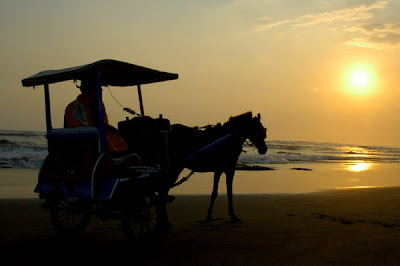Java's south coast is shrouded in mystery and legend, and nowhere is this more alive than in the heartland of Javanese culture and lore, Yogyakarta. The special province of Yogyakarta is remarkable for many reasons. It is home to a still-functioning royal court with a widely-loved monarch. Just to the north of the city is the legendary volcano, Merapi, also known for being the most active volcano in the world!
And directly to the south, forming the third element in this spiritual triumvirate is Parangtritis beach - where the Indian Ocean pounds against rugged, windswept shores, located about 27 km. from Yogyakarta. This is not the setting for your usual kind of beach holiday. Gone are the gently swaying palms and white sands - they are replaced with black volcanic sands and a sparse tumultuous environment of tossing seas and jagged rocks. The spirituality and vitality of Parangtritis is immediately apparent. This is no ordinary beach, it is the realm of ghosts and goddesses - it is the realm of queen Ratu Kidul or Nyai Loro Kidul.
 Nyai Loro Kidul has many different names, which reflect the diverse stories of her origin in a lot of sagas, legends, myths and traditional folklore. Other names include Ratu Laut Selatan ("Queen of the South Sea," meaning the Indian Ocean) and Gusti Kangjeng Ratu Kidul. Many Javanese believe it is important to use various honorifics when referring to her, such as Nyai, Kangjeng, and Gusti. People who invoke her also call her Eyang (grandmother). In mermaid form she is referred to as Nyai Blorong. The Javanese word loro literally means two - 2 and merged into the name of the myth about the Spirit-Queen born as a beautiful girl/maiden. (Wiki)
Nyai Loro Kidul has many different names, which reflect the diverse stories of her origin in a lot of sagas, legends, myths and traditional folklore. Other names include Ratu Laut Selatan ("Queen of the South Sea," meaning the Indian Ocean) and Gusti Kangjeng Ratu Kidul. Many Javanese believe it is important to use various honorifics when referring to her, such as Nyai, Kangjeng, and Gusti. People who invoke her also call her Eyang (grandmother). In mermaid form she is referred to as Nyai Blorong. The Javanese word loro literally means two - 2 and merged into the name of the myth about the Spirit-Queen born as a beautiful girl/maiden. (Wiki)Sometimes Nyai Loro Kidul literally can be spoken of as a "naga", a mythical snake. This idea may have been derived from some myths concerning a princess of Pajajaran who suffered from leprosy. The skin disease mentioned in most of the myths about Nyai Loro Kidul might possibly refer to the shedding of a snake's skin.
Legends of Ratu Kidul and her tragic, demise abound. According to one account she was the great aunt of Raden Joko Suruh, an orphaned prince of the Pajajaran kingdom. It is said that she appeared to him as a hermit and instructed him to establish the Majapahit Empire in east Java. Many generations later, a descendant of Joko Suruh, came to the shores of Parangtritis to meditate in preparation for a great battle with the kingdoms of the north. He was visited by Ratu Kidul who took him to her underwater kingdom where he studied the arts of war and love. After three days he emerged at Parangkusumo. To this day, she is said to be in communion with each of the sultans of this line to aid them when they come and pray for her assistance. Parangkusumo also remains a place of great spiritual significance and constantly attracts pilgrims who leave offerings and pray for Ratu Kidul's help. Another regular visitor is the sultan himself. At his coronation ceremony in 1989, a sudden gust of fragrant wind was noted not only by the sultan but by many others in attendance. It is believed that this wind signified the spiritual presence of Ratu Kidul.
Ratu Kidul's favourite color is a special shade of pale yellow-green known as gadung melati. Local folklore warns visitors not to wear the colour green, or the Queen will entice the wearer into the ocean to drown. And that is why you will rarely see anyone wearing green near the beach. If you happen to be in the wrong place at the wrong time, Ratu Kidul or her one of her ministers, may just claim you as another subject in her underwater court. Each year the treacherous waters here take a few more lives, each year Ratu Kidul's watery court grows a little larger, and those who survive fo on whispering the legends of the ghostly queen.


